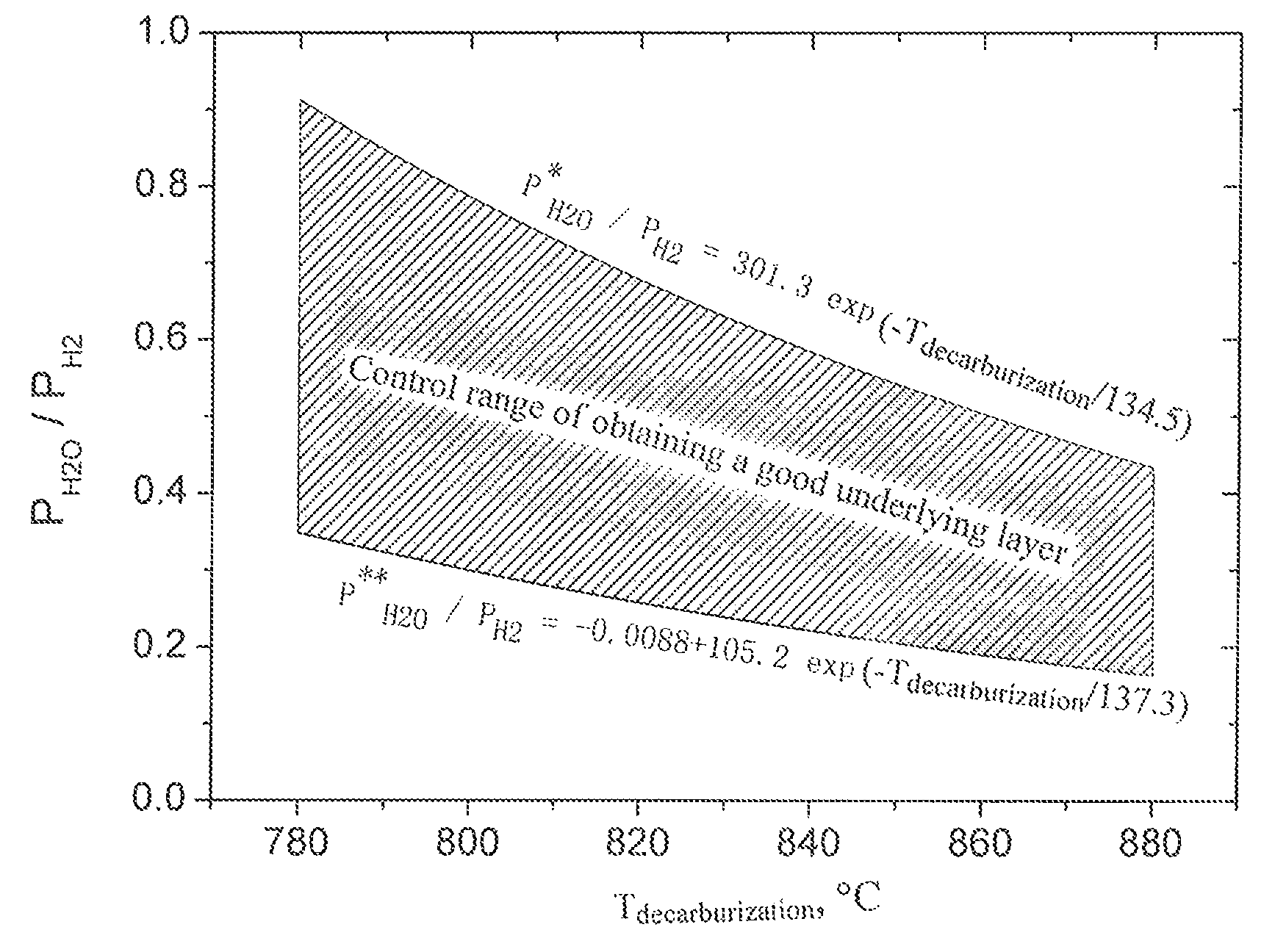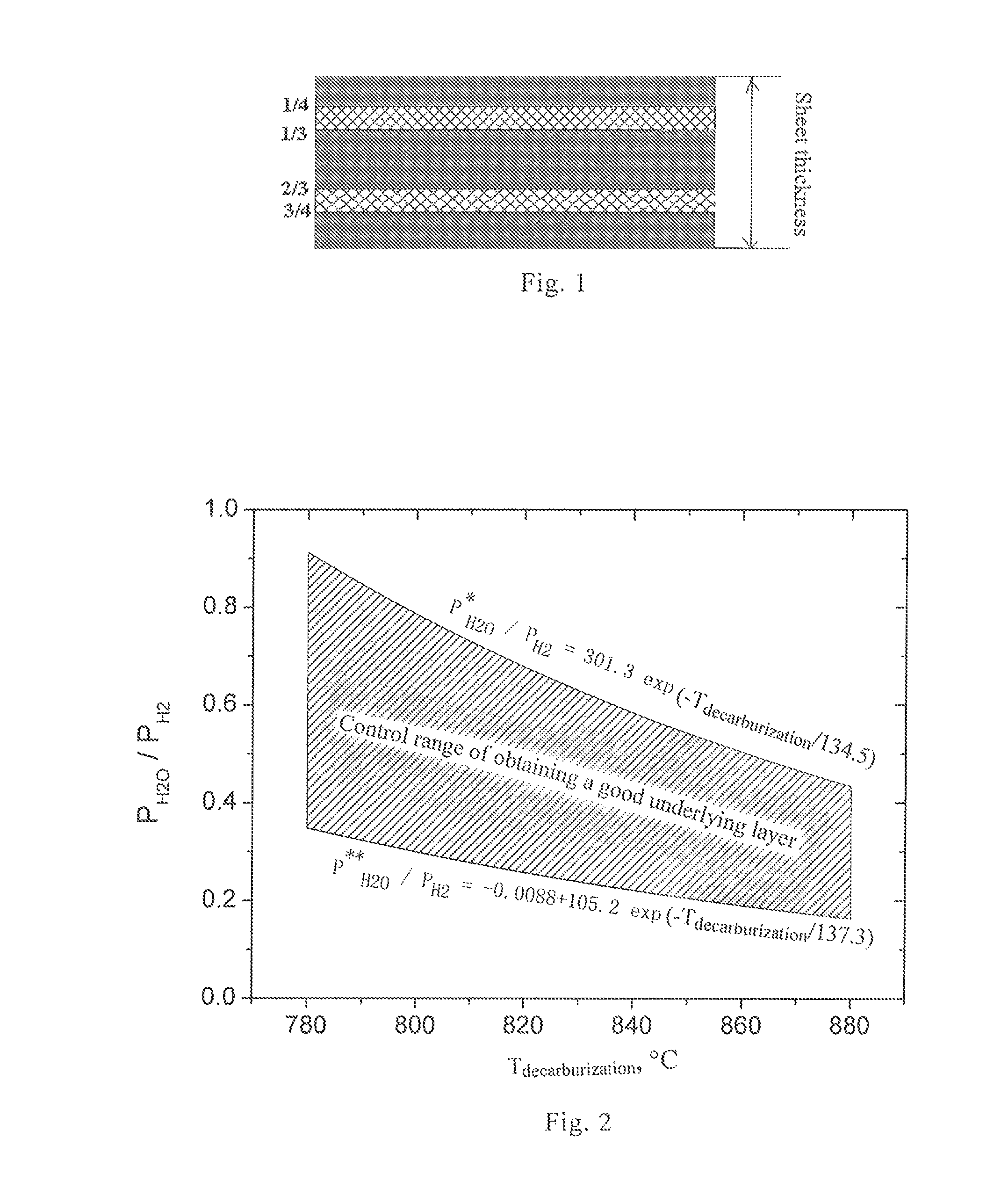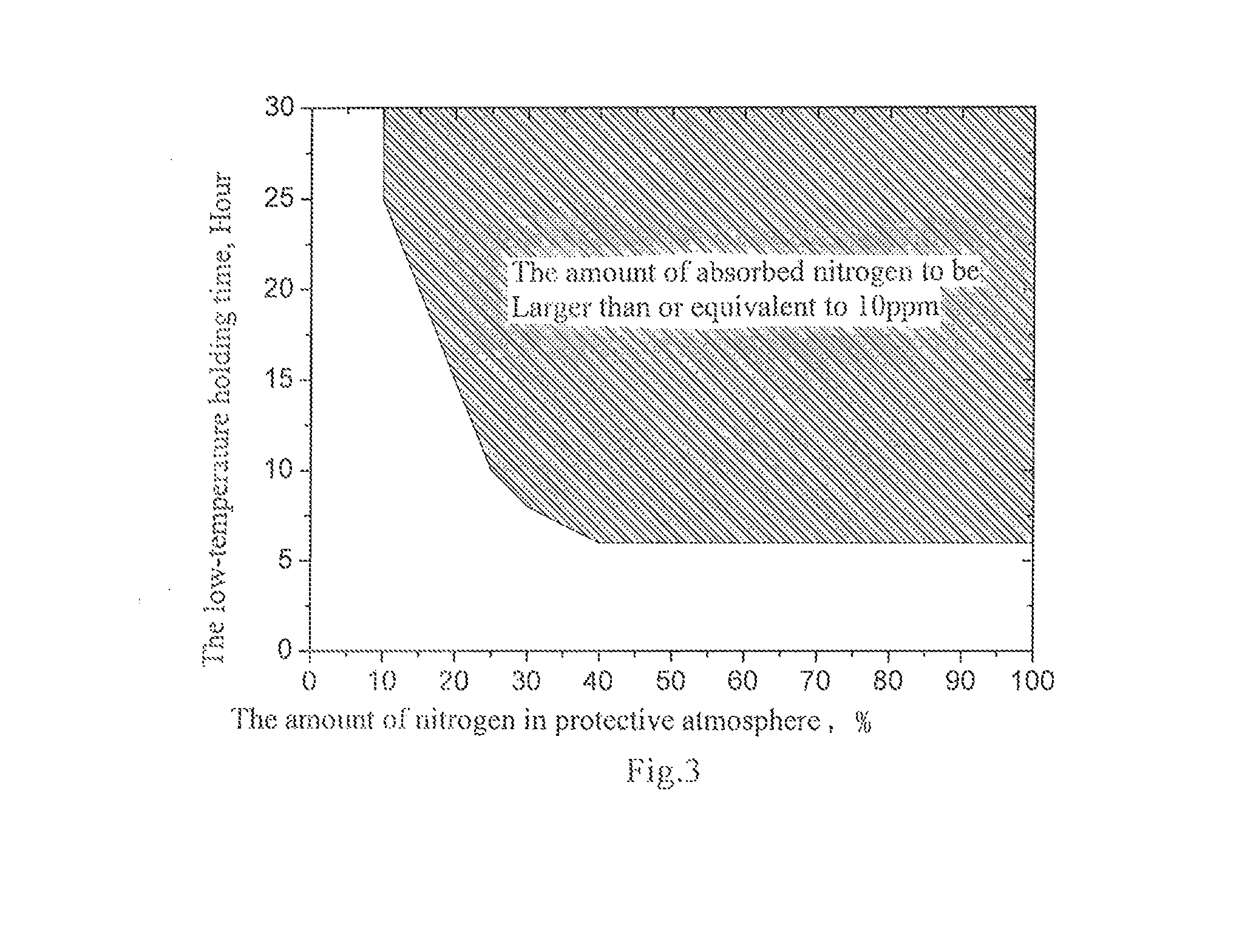Method for manufacturing grain-oriented silicon steel with single cold rolling
a technology of grain-oriented silicon and cold rolling, which is applied in the direction of heat treatment apparatus, magnetic bodies, furnaces, etc., can solve the problems of high energy consumption, low utility of heating furnaces, and high production cost of grain-oriented silicon steel, and achieves good underlying layer, good underlying layer, and optimized steel sheet texture and the amount of favorable inclusions.
- Summary
- Abstract
- Description
- Claims
- Application Information
AI Technical Summary
Benefits of technology
Problems solved by technology
Method used
Image
Examples
example 1
[0071]Steel was smelted in a 500 kg vacuum furnace. The chemical compositions of and the hot rolling conditions for the steel are shown in Table 2 and 3. Normalization was carried out under the following conditions: 1130° C.×5 s+930° C.×70 s+50° C. / s of cooling. The band steel was rolled to 0.30 mm. After decarburized and coated with MgO separator, the steel was subjected to high-temperature annealing and leveling annealing, coated with insulating coating, and measured for its magnetism. The results of cross-over experiments are shown in Table 4.
[0072]
TABLE 2Chemical compositions of experimental steel unit: %CSiMnPSAlsol.NCuSnA0.0573.850.130.020 0.00600.02750.01100.0060.012B0.0352.920.150.0100.012 0.0153 0.0054 0.59 0.14
[0073]
TABLE 3Conditions for hot rolling experimental steel unit: ° C.TemperatureHeatingat the End ofCoilingThicknessTemperatureRollingTemperature(mm)C11609005002.5D12409305202.5
[0074]
TABLE 4Experimental ResultsB8 (T)P17 / 50 (W / kg)DescriptionAD1.831.39ComparativeExamp...
example 2
[0075]Composition A in Table 2 and hot rolling condition C in Table 3 were combined to carry out normalization experiments. The effect of normalization process condition 1120° C.×6 s+910° C.×X s+Y ° C. / s on texture is shown in Table 5, and the relationship between normalization process condition and magnetism is shown in Table 6.
[0076]
TABLE 5Relationship between normalization process condition and texture ratioX (HoldingY (Cooling DescriptionTime )Rate ° C. / s)I (110) [100] / I (001) [110]Comparative20300.12ExampleInventive40300.25ExampleInventive190307ExampleComparative205309ExampleComparative7090.01ExampleInventive70156ExampleInventive70581ExampleComparative70659.5Example* Here, the number of crystal grains with Gaussian texture is not less than 5% of the total number of crystal grains.
[0077]
TABLE 6Relationship between normalization process condition andmagnetismDescriptionB8 (T)P17 / 50(W / kg)Comparative1.502.12ExampleInventive Example1.841.34Inventive Example1.851.25Comparative1.801.4...
example 3
[0078]Composition A in Table 2 and hot rolling condition C in Table 3 were combined to carry out normalization experiments. The effect of normalization process condition 1120° C.×5 s+910° C.×70 s+20° C. / s, decarburizing time, temperature and dew point on magnetism and the underlying layer is shown in Table 7 and 8.
[0079]
TABLE 7Relationship between decarburizing temperature, time, dew pointand magnetismDecar-Proportion Decar-burizingDewof N2 inburizingTempera-PointProtectiveP17 / 50DescriptionTime (s)ture ° C.° C.AtmosphereB8 (T)(W / kg)Comparative 200770+1810%1.71 1.88ExampleInventive200790+4055%1.84 1.34ExampleInventive150830+7018%1.89 1.10ExampleInventive250850+6050%1.87 1.18ExampleInventive345850+5025%1.86 1.21ExampleInventive90870+7780%1.85 1.23ExampleComparative370890+8514%1.63 2.05ExampleComparative 150900+1988%1.51 2.41Example
[0080]
TABLE 8Relationship between decarburizing temperature, time, dew pointand the underlying layerDecar-Proportion NitrogenDecar-burizingDewof N2 inIncre-...
PUM
| Property | Measurement | Unit |
|---|---|---|
| temperature | aaaaa | aaaaa |
| temperature | aaaaa | aaaaa |
| temperature | aaaaa | aaaaa |
Abstract
Description
Claims
Application Information
 Login to View More
Login to View More - R&D
- Intellectual Property
- Life Sciences
- Materials
- Tech Scout
- Unparalleled Data Quality
- Higher Quality Content
- 60% Fewer Hallucinations
Browse by: Latest US Patents, China's latest patents, Technical Efficacy Thesaurus, Application Domain, Technology Topic, Popular Technical Reports.
© 2025 PatSnap. All rights reserved.Legal|Privacy policy|Modern Slavery Act Transparency Statement|Sitemap|About US| Contact US: help@patsnap.com



